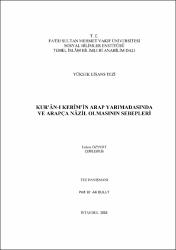Kur’ân-ı Kerîm’in Arap Yarımadasında ve Arapça Nâzil Olmasının Sebepleri
Citation
ÖZYURT, Erdem, Kur’ân-ı Kerîm’in Arap Yarımadasında ve Arapça nâzil olmasının sebepleri, Fatih Sultan Mehmet Vakıf Üniversitesi Sosyal Bilimler Enstitüsü Temel İslam Bilimleri Anabilim Dalı, Yayımlanmamış Yüksek Lisans Tezi, İstanbul 2016Abstract
Hz. Peygamber'in Arap olmasından dolayı vahiy dilinin de Arapça olması gayet doğaldır. Gönderilen mesajın en iyi şekilde anlaşılması, mesajı ileten Peygamberin ve toplumunun diliyle nazil olmasına bağlıdır. Kur'an evrensel bir mesaj olmakla birlikte, dil açısından ilk hitap çevresinin dilini kullanmıştır. Bu, evrenselliğe aykırı bir durum değildir. Eğer mesaj Arapçanın dışındaki bir dil ile gönderilmiş olsaydı, o toplum, bu durumu yadsıyacak ve mesajın hedefine ulaşması oldukça zorlaşacaktı. Başka bir ifadeyle mesaj anlaşılmaz hale gelecekti. It was most natural and reasonable that the Holy Quran has been descended Arabic for the Messenger was being Arab. The Message should be in his own tongue, that he might explain it in every detail, with the greatest power and eloquence. Even though it was to be for the whole world, its initial exposition was thus to be in Arabic. Now when the Qur'an is being sent downin their own tongue so that they may understand it, they raise the objection: why has it been sent down to an Arab in Arabic? But if it had been sent downin foreign tongue, these very people would have said, "How strange! An Arab Messenger has been sent to the Arabs, but the Revelations being sent to him are in a tongue which is neither understood by him nor by his people."



















